The Images That Burn
I was 23 when I cut my father out of my life. He'd struggled with booze, rage, and being good enough. When he died in 2010, he was a convicted felon. I'd made the right call. Still, he was my father.
My late father was a deeply troubled man who struggled with alcohol, rage, and being seen as good enough. A convicted felon, he had a criminal record that I’m still trying to sort out and wrap my head around.
My earliest memories of my father include the handsome face, the jet-black hair, the bright blue eyes, and the wide, big-toothed smile.
As time went on, though, those early memories were crowded out by the horrors that often accompany alcohol and domestic abuse. After my mother divorced my father when I was 8, he married — and divorced — two more times.
During both of those marriages, I watched history repeat itself in all the calls to the police, in all the fights in public places, and in all the punches to faces — including my own — when people dared to tell him he was out of control.
In 1991, I was 23 years old when I finally cut my father out of my life. Nineteen years later, in 2010, I was 42 years old when I learned that he’d passed away of metastatic esophageal cancer. My first emotion upon hearing the news was relief.
Maybe now he’ll be at peace.
Maybe now I can stay out of the rabbit holes of Internet searches, trying to find out where he is and how he’s doing.
Maybe now I can stop questioning whether I’m a horrible daughter.
I inherited my father’s button nose, short stature, and tendency to overwrite. Like me, my father was the firstborn of three children. We both taught for a time before switching careers: he went into law, and I went into publishing. Like him, I’ve always loved documenting life in photos.
I don’t remember how old I was when I first heard about the fire, but the adults in my life — including my mother and stepdad — clearly had some knowledge of it and kept the details vague.
There’d been a garage where my father had stored things. Among those things were many photos of my parents’ wedding — and pictures of me as a child.
In recent years, I’ve obtained my father’s criminal record.
I’ve learned of his convictions for shoplifting, disturbing the peace, resisting arrest, driving on a revoked license, using an accelerant to start fires, obstructing a peace officer, and destroying evidence.
I’ve always known my father was a troubled man. Nevertheless, he was my father.
I sift through the files I keep in my office, overflowing with the letters and cards my father’s written and sent through the years. On the front of one, sent to me during my freshman year in college (four years before I cut off contact), the words read:
You’re a wonderful daughter,
and I want to tell you how proud I am of you…
proud of the woman you’ve become,
of your accomplishments,
of your ability to make your own choices,
and especially of the way we've both learned
to respect one another
and share close feelings
in spite of changes we’ve had.
I’ll always be proud of you…
and now more than ever,
I want you to know how much
I’ll always love you.
—Ellen Brenneman
Inside the card, in his perfect handwriting, my father wrote:
December 23, 1987
Dear Chrissy —
It has been some time since we last saw each other and had a chance to talk. Many things happen, even in short periods of time. Well, I can honestly say that not a day has passed that I have not thought of you, wondered how you were doing and hoped that all was well with you.
If I were to wish upon a star I would hope that our communication would be better. You know I’m always here for you — for whatever you need and whenever you need it. The waters of my life are a bit choppy right now, but then again, aren’t they that way for everyone?
I hope you have a very Merry Christmas and a great New Year. I’ve sent a couple of gifts that I got from Mexico when I was there. I hope you enjoy them as much as I had fun picking them out for you.
I miss you, kid, and hope the very best for you. Write when you have the chance. I promise to scribble back.
Merry Christmas and Happy New Year, Princess…
All my love,
Dad


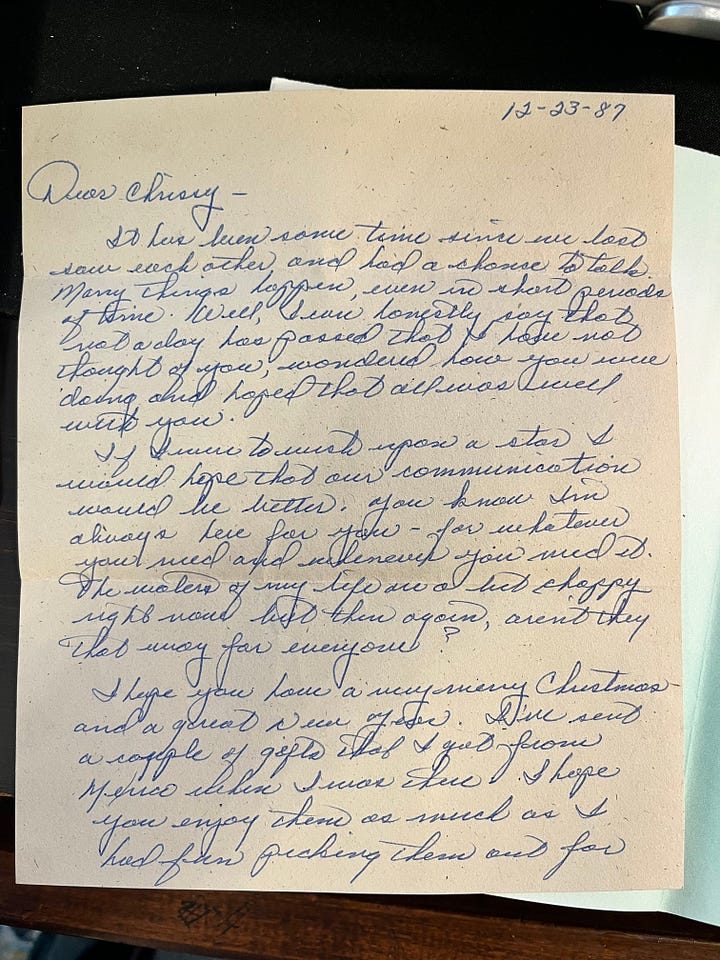
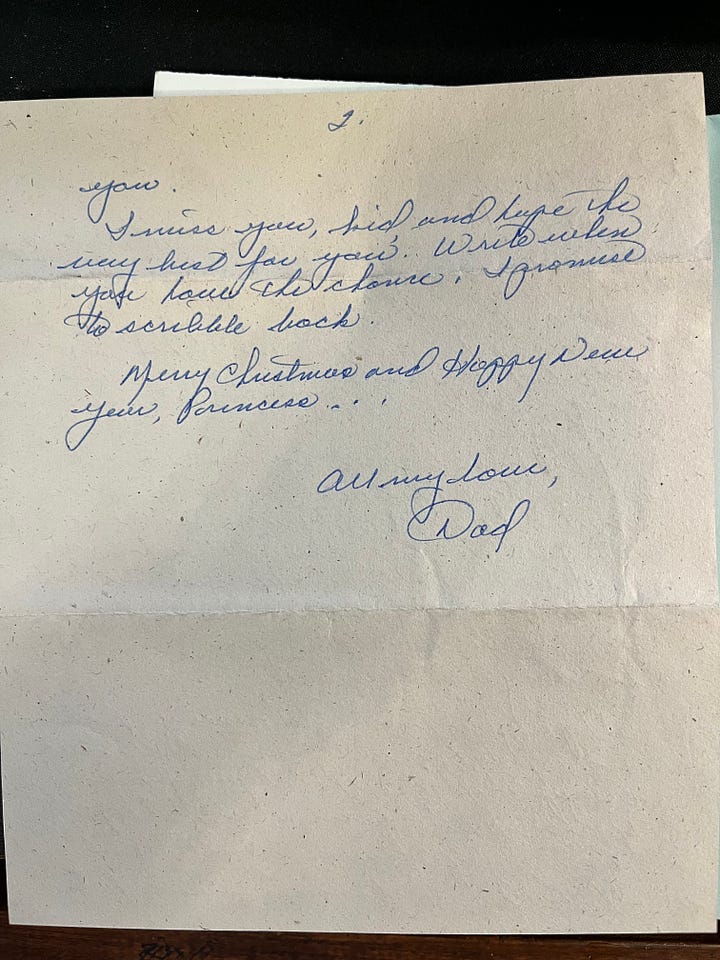
As I transcribe those words now, nearly forty years later, tears run down my cheeks. I still remember how hard it was to receive that plea from him, how confused and guilty I felt for being a busy college student who had no interest in connecting with a parent whose life was filled with constant drama. I wanted my father to be as perfect as his handwriting, as dependable as he professed to be, but the reality is, he wasn’t. He was hurting, he was human, and his presence made me feel unsafe. I didn’t know anyone else who had such a complicated relationship with a parent, and I didn’t dare speak of mine.
Dutifully, I’d write back — usually something short but respectful — as a way to shake him away for a bit. I’d thank him for the presents, for the checks, for the “thinking of you” cards. As cruel as he could be to me and others, he was my father. I hadn’t yet learned how to override my habit of people-pleasing.
But fresh out of college, I was engaged to be married when I learned (through one of my father’s friends) that he’d been arrested once again for driving on a revoked license. Will you bail your father out?
At 23 years old, I was about to start my new, adult life with a young man. A voice inside — one that I’d never heard before — told me that I had neither an obligation nor the emotional capacity to care for my 46-year-old father. And so, when my father called me from jail, pleading for me to rescue his ass, I thanked him for bringing me into the world, then told him I was done.
I went on to have three children of my own, fastidiously documenting their lives in the hopes that, one day, they’d enjoy the visual proof of how they’d evolved into adults. My kids never met my biological father, and I never made it a secret why.
When asked, I’d speak the truth. “My father wasn’t a kind man,” I’d say. That seemed to be enough.
My kids have always known my stepdad as their granddad. He’s dependable, and though he doesn’t write in cursive, Papa’s penmanship is perfect.
It always bothered me that I had very few childhood photos of my own to share with my kids. They’d been burned in that fire my father set in that garage so long ago. Soon after it happened, I remember my father picking me up for a weekend visit and telling me he’d been lucky to get out alive…that he’d saved a cat from death…and that the burn on his forearm “only hurt a little.”
How could it occur to me then how much the photos of my younger years would be missed?
After the garage fire, I remember hugging my father and telling him how happy I was that he was okay. I remember reassuring him that people and pets were more important than things. I was, perhaps, twelve years old, tending to my father’s anxiety and worry, downplaying all that I’d lost in those flames.
Last weekend, my mother and stepdad — who’ve been married nearly 50 years — were putting their house back together after a home renovation project. They’d been going through cabinets, drawers, and closets, sifting through items to toss, donate and keep.
My stepdad is the man who actually raised me. He paid the medical and orthodontic bills, put me through college, offered to adopt me, and walked me down the aisle when I got married. When my mom first married him in 1977, my sister and I (then 7 and 9) called him Bob, but on my wedding day in 1991, with my arm tucked into his as we entered the church, I called my stepdad by his proper name for the very first time.
“I love you, Dad,” I’d said. The words — and the name — felt right.
[Perhaps in another post, I’ll write about how, when he handed me over to my husband-to-be, he said in front of the entire congregation, “Here you go. No refunds. No exchanges.” If I’ve inherited anything from my stepdad, it’s a dry and quirky sense of humor.]
“I have something for you,” Dad said as he and Mom showed off their newly painted walls and freshly laid laminate floors. “I found them while cleaning out some closets.”
He handed me a tattered photo album.
As I peeked inside, I found a small collection of photos from my earliest years — photos I’d never known existed — that had somehow, mercifully been tucked away for safekeeping.

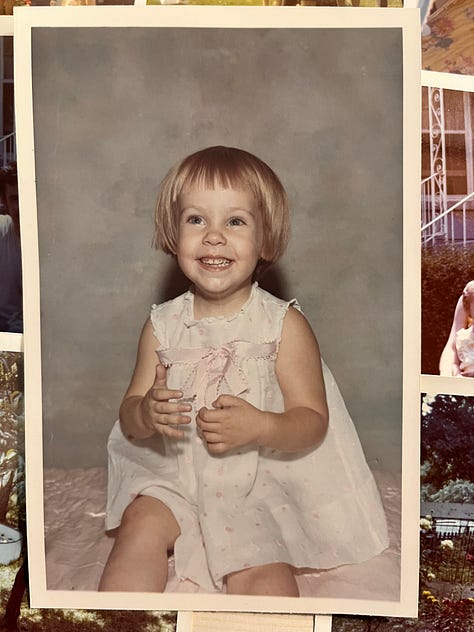
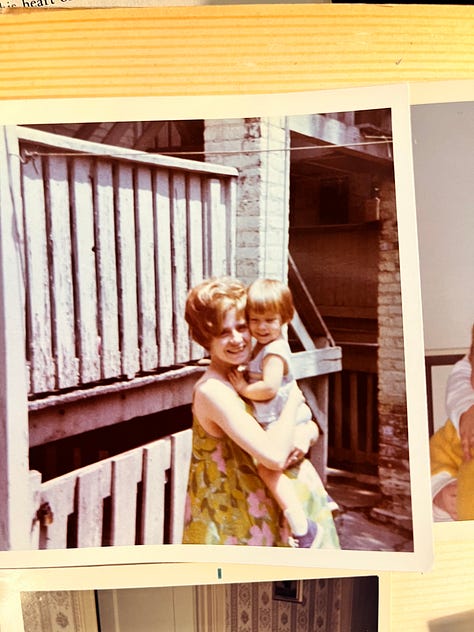
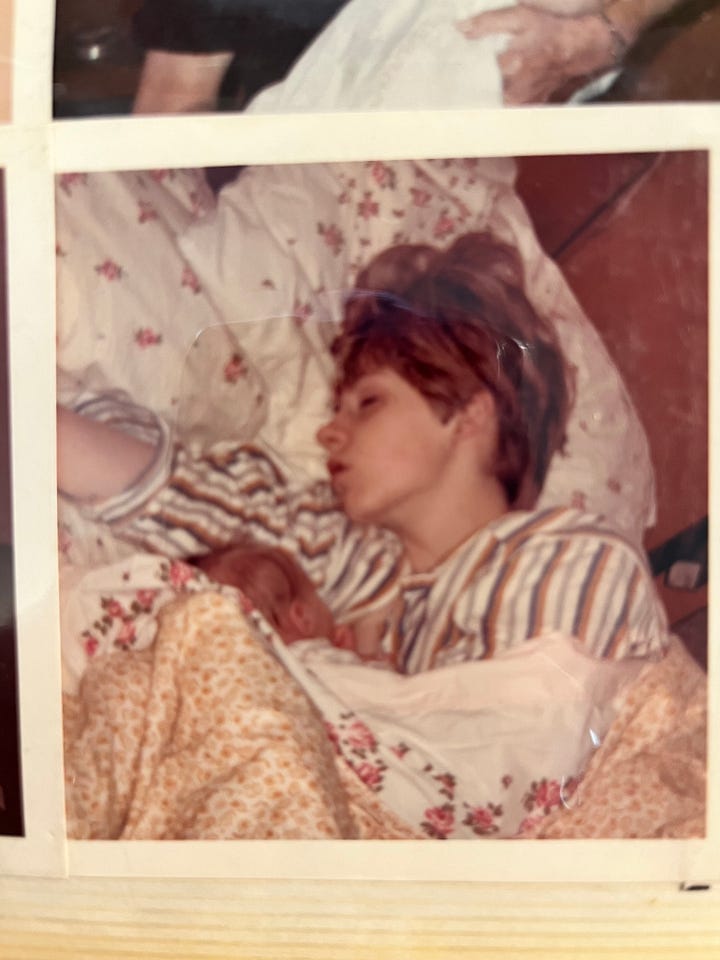
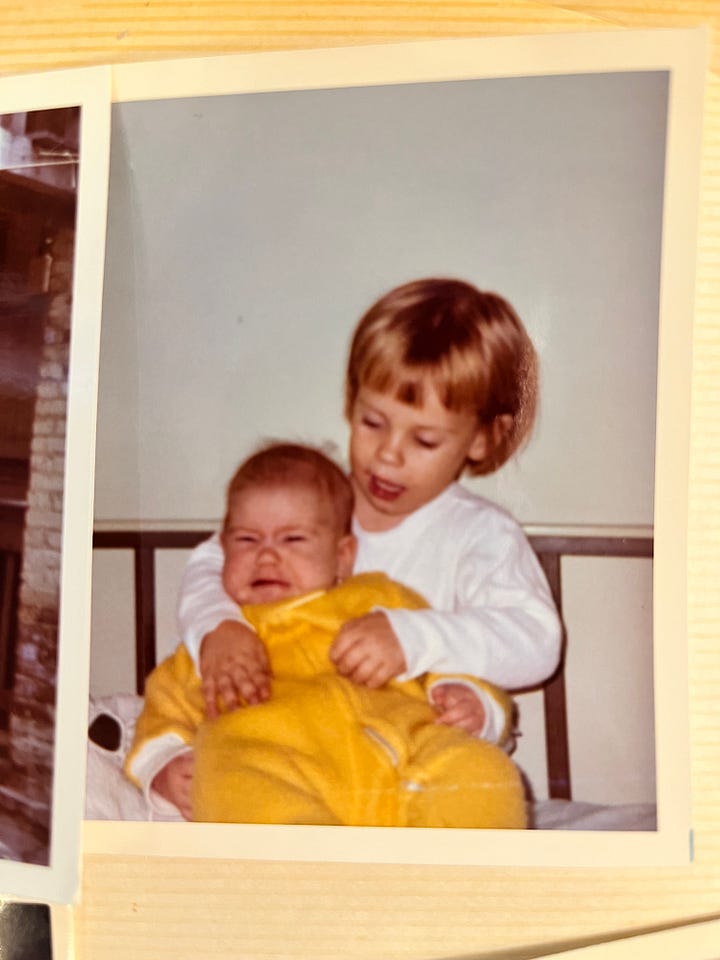
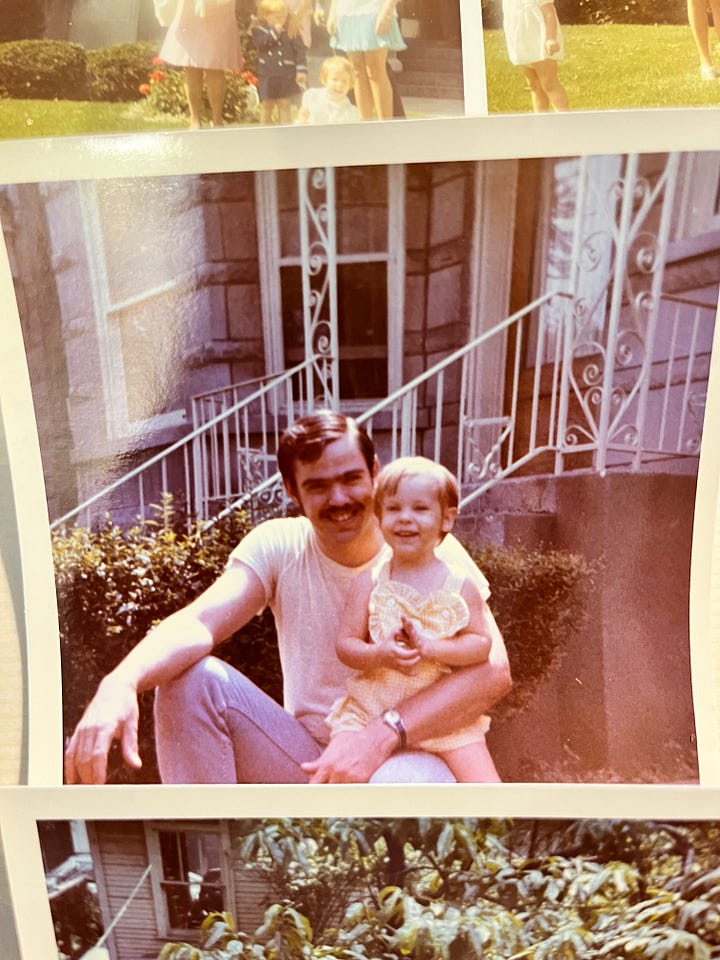
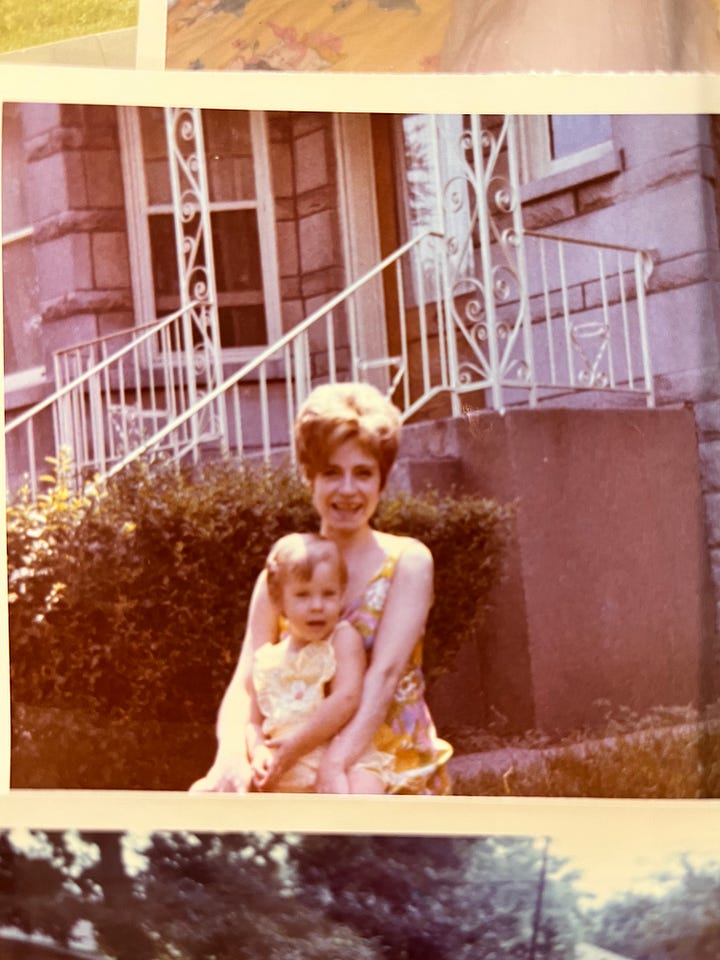
I don’t regret cutting my biological father out of my life, nor do I regret establishing boundaries — parent or not — with someone who made me feel unsafe. For decades, I tried my best to have a healthy relationship with my father, but when that became impossible, I did what I had to do.
The only thing I regret is not telling the world sooner how much I love and admire my stepdad.
That he was the one who handed me these photos says everything about him — as a father and as a man.
Christine Wolf is the author of Politics, Partnerships, & Power: The Lives of Ralph E. and Marguerite Stitt Church (Master Wings Publishing, 2023). She’s the founder of Writers’ Haven, a workspace for women writers in Evanston, Illinois. She coaches memoirists and essayists and regularly leads workshops and retreats focused on expressive writing for emotional healing.





This is beautiful and very moving ❤️
Thank you for sharing. I especially resonated with the attempts to assuage your father’s feelings, even whilst your own were subdued. Such a potent reflection on a relationship that needed to be severed for your own sanity and health.